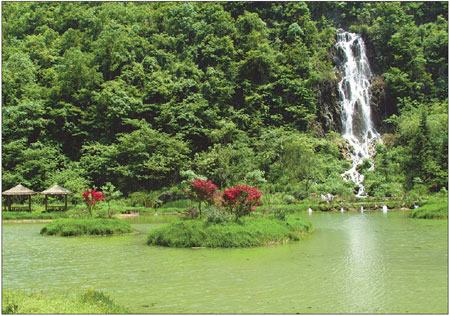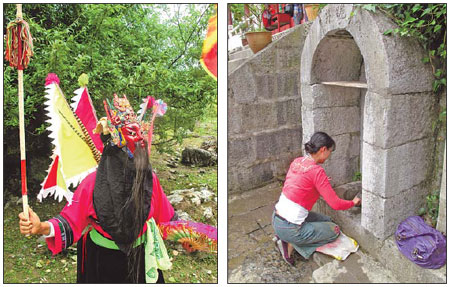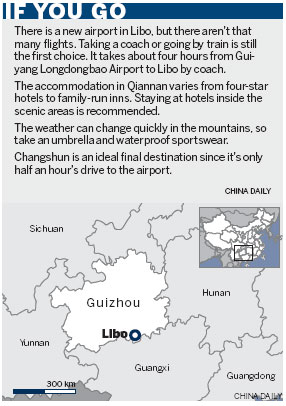|
 |
|
Primitive forest, spectacular waterfalls and torrential rivers are everywhere in Qiannan prefecture in Guizhou province.[Photos/China Daily]
|
 |
|
Left: The mask dance is one of the age-old traditions of ethnic groups in Libo. Right: The well in Baiyun Mountain will bring you to your knees.
|
Qiannan Bouyei and Miao autonomous prefecture is packed full of natural and cultural attractions, Wang Ru discovers.
After a three-hour flight from Beijing, I arrived in Guiyang, capital city of Southwest China's Guizhou province, which enjoys mild weather and a slow pace of life.
Guizhou has many popular places of interest, including Huangguoshu (Yellow Fruit Tree) Waterfall and Maotai town, where China's most famous liquor is distilled. But this time, I traveled further, to a mystical area in the south - Qiannan Bouyei and Miao autonomous prefecture.
If you are a demanding tourist, like me, Qiannan will not disappoint you. The distinctive scenery, charming ethnic culture and some historical mysteries kept me busy and delighted for four days.
Qiannan prefecture has a population of 3.96 million, over half of whom are from 22 ethnic groups that have lived in the area for thousands of years, including Bouyei, Miao, Dong and Sui.
A three-hour coach ride from Guiyang, passing karst landform mountains, brought me to Libo, nicknamed "emerald of the Earth's belt".
Walking into Zhangjiang National Scenic Area, Libo's main attraction, was like visiting a magnificent art gallery, where nature had spent millions of years creating its incredible works of art.
Surrounded by primitive forest, every path leads to dizzying scenery. You may encounter spectacular waterfalls or a small oasis in the middle of a torrential river, among other sights.
Libo is the hometown of pioneering revolutionary Deng Enming, who was born in 1901 and left for Shandong province, where he founded one of China's earliest Communist groups.
On July 1921, he attended the First National Congress of the Communist Party of China in Shanghai, along with the other 11 delegates, including Mao Zedong.
The karst landform in Libo was listed as a UNESCO World Natural Heritage site in 2007. The small town is developing tourism facilities, such as new hotels and restaurants supplying local dishes, such as spicy fish hotpot and rice liquor.
Those planning to see the karst landscapes of Guilin and Yangshuo in adjacent Guangxi Zhuang autonomous region, could do just as well to avoid the crowds and enjoy a more relaxing travel experience.
You can walk along the quiet streets in Libo town, soaking up the peaceful lifestyle, or board a ship to cruise Shuichun River, passing by the splendid mountains. Need more excitement? A rafting experience will supply the thrills.
If time allows, a hike in the primitive forest of Maolan National Reserve is an ideal way to explore more scenic locations. Rare plants and species such as "iron tree" and colorful butterflies will mark your way.
You can also visit the ethnic group villages in the remote mountains, to get a feel of their distinctive traditions and listen to the mystical tales told by their ancestors.
At night, Miao women sang folk songs and I was enchanted as I looked up at the twinkling stars and joined the party to dance hand-in-hand around a bonfire with the adorable Miao women in their traditional clothes, decorated with handmade silver jewelry.
The next morning we left Libo for Duyun, the capital city of Qiannan Bouyei and Miao autonomous prefecture. I was jealous of the locals since they can drink one of the best early spring Chinese green teas and live by the closest urban primitive forest in the country.
Doupeng Mountain Scenic Area is only 22 km from Duyun. The 61.8-sq-km area is covered by primitive forest where Jianjiang River passes through. Karst caves, streams and valleys are everywhere.
The 200-meter Shiban Street was built over six centuries ago and is paved with 10,001 stones. The three-story wooden houses along both sides of the streets sell antiques and works of folk art.
Xu Xiake is a well-known Chinese travel writer and geographer of the late Ming Dynasty (1368-1644). He traveled throughout China in 30 years and wrote up his experiences in 2.6 million characters. In his later life, he traveled 1,500 km in Guizhou in 51 days and left a travel diary, one third of which was about his visit to the Qiannan area.
With just a walking stick and a blanket, Xu overcame many hardships during his trip in Qiannan. He lived on food given by monks in the temples and swam across a torrential river to arrive in Duyun.

Following in Xu's footsteps, I visited Fuquan city. It is said the semi-mythical Taoist master Zhang Sanfeng spent eight years practicing tai chi on Fuquan Mountain, where there is a stream forming a yin-yang symbol at the foot of the mountain.
A legend has it that Xu didn't go to Guizhou just for the pleasure of travel, but rather to discover the grave of Emperor Jianwen, the second emperor of the Ming Dynasty.
His disappearance is one of the biggest mysteries of Chinese history. After a short reign (1398-1402) he was seized by his uncle Zhu Di and vanished. Some historians believe he died in a fire, while others think he escaped with his concubines and later became a monk.
Baiyun Mountain in Changshun, a county in north Qiannan area, is said to be the place where the emperor hid until his death in a cave near the Buddhist temple.
When I squeezed into the small and dark cave, I felt sympathy for the poor emperor who must have been living in fear of his brutal uncle.
There is also a well on Baiyun Mountain named "On Your Knees", since the only way to get water from the well is to kneel down in front of it. Drinking the icy cool water, I thought my trip to Qiannan was neatly summed up by the saying, "Respect for nature is better than kneeling to an emperor".
|